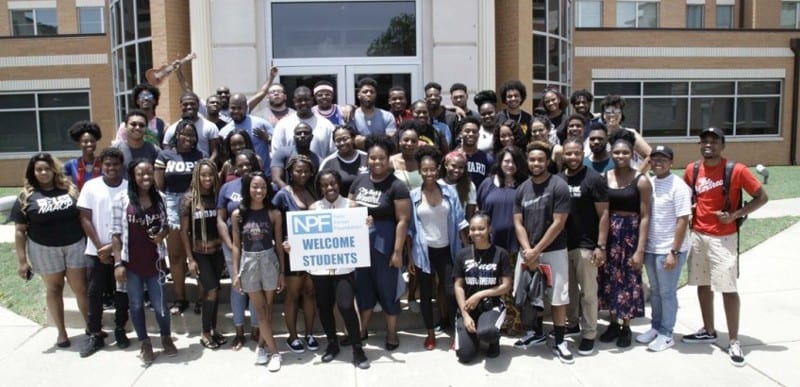Nate Parker Foundation Hosts Program for Aspiring Black Filmmakers at Wiley University

Seeking to disrupt the film industry by fostering diversity behind the camera, the Nate Parker Foundation (NPF) today kicked off its 2018 Summer Film Institute at Wiley University [a UNCF-member institution].
“It’s an honor and privilege to make it back here every year to work hand-in-hand with students seeking a career in film,” said Nate Parker, Chairman of the Nate Parker Foundation. “What we must realize is that there is a real color barrier for students looking for jobs in front of and behind the camera in Hollywood. It is my hope that this program can serve as a stepping stone to help create networks and ladders to their success as filmmakers.”
Herman J. Felton, Jr., president and chief executive officer of Wiley University said, “Through our continued partnership with the Nate Parker Foundation, we are sowing the seeds for change in the film industry by nurturing the desire of emerging artists to learn the craft and skill of filmmaking. The work these artists will produce in their careers will serve as mirrors that will better reflect society as we all truly see it, while giving the world the opportunity to take in, appreciate, and respect the history, stories and experiences of our many cultures.”
Now in its third year, the Nate Parker Foundation Summer Film Institute (NPFSI) is a highly-competitive flagship program that equips aspiring black filmmakers with the professional skills and cultural knowledge needed to create films that confront social justice issues.
With broad support from individual donors and established organizations such as the Ford Foundation, NPFSI is dedicated to providing support and resources for aspiring black filmmakers. Students in the summer film institute receive professional training, mentorship and access to film industry networks. Training includes comprehensive filmmaking seminars and hands-on workshops in screenwriting, directing, cinematography, acting and producing. The program is open to high school seniors, college students and recent college graduates, all of whom demonstrate a passion for producing films involving people and communities descended from Africa.
Courses in the seven-day competitive program include a screenwriter’s workshop; lighting, editing, producing film on budget; cultural media literacy and critical thought; directors studio, acting studio, cinematography, African diaspora history and culture; and film media and social justice. Participants of the program were selected from a pool of applicants who wrote and submitted two essays, a creative resume, a letter of recommendation and school transcripts to the foundation.
The program is hosted by the historically black, liberal arts college, Wiley University, in Marshall, TX. The college is also known for the 2007 film, The Great Debaters, starring Denzel Washington, Forest Whitaker and Nate Parker. The film, which was directed by Denzel Washington and lists Oprah Winfrey as a producer, is based on a true-story of a then little-known Wiley University debate team, which endured the 1930s Great Depression, Jim Crow South and lynch mobs to challenge and defeat the University of Southern California’s prestigious debate team. In the movie, however, Wiley University takes on and defeats the debate team of Harvard University.
The program will conclude with a red carpet event open to the public at the Julius S. Scott, Sr., Chapel at Wiley University on Saturday, July 21, featuring a short film written, directed and produced by NPFSI students. This year, more than a dozen notable guest lecturers will teach and mentor the aspiring filmmakers. Notable past guest lecturers have included Radha Blank, a playwright and writer for the FOX show Empire; Emir Lewis, an Emmy-nominated producer and editor; Qasim “Q” Basir, an award-winning filmmaker; Cary Anderson, an acclaimed acting coach; Monika Watkins, documentary filmmaker; Kimberly Boehm, scholar of African American and 20th-century U.S. history; and Brian Favors, co-founder of Sankofa Community Empowerment.